1 The Musical Solomon
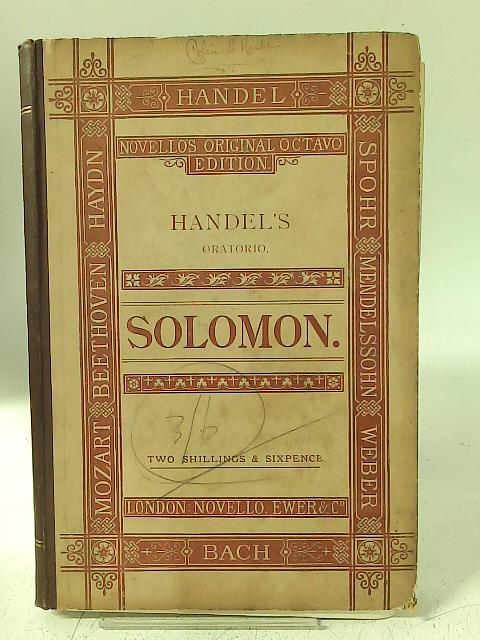
In 1748 Handel composed the oratorio ‘Solomon’, based on the stories about him in the Bible. The music is glorious. But it takes far too rosy a view of Solomon himself:
- “From the east unto the west,
- Who so wise as Solomon?
- Who like Israel’s king is bless’d,
- Who so worthy of a throne?”
My argument is that he was not worthy of a throne on three counts:
1 He lied his way to the throne in a clever coup d’erat.
2 He created a system of absolute monarchy which fell apart at his death.
3 The temple itself helped corrupt the religion of Israel, as Solomon did himself.
2 The Inventive Solomon
The main source for the reign of Solomon and its aftermath is 1 Kings 1-12. (1 & 2 Chronicles are very late). So how much can be relied on? Jehoshophat son of Ahiud was the recorder, or court historian, for David and Solomon and possibly Rehoboam. He may well be the first-hand witness to David’s adultery with Bathsheba, to his son Absalom’s nearly successful rebellion, and to the debates which took place at the start of Rehoboam’s reign.
But Solomon did not want a truthful record. What he wanted was one which built up his power. You can see the struggle within the text of the Bible. 1 Kings 3.3 reads: ‘Solomon showed his love for the Lord by walking according to the statutes of his father David, except that he offered sacrifices and burnt incense in the high places’. That’s a pretty big ‘except’. 1 Kings has to be read with care.
3 The Cunning Solomon
Solomon was not the obvious successor to David. David had six sons born to him while he was in Hebron, i.e. before he captured Jerusalem. The key ones were:
- Amnon – killed by Absalom to avenge the rape of his sister;
- Absalom – killed when in rebellion against his father;
- Adonijah – the natural heir-apparent;
- Ten sons born when David was in Jerusalem, including Nathan and Solomon.
What happened when David was about to die?
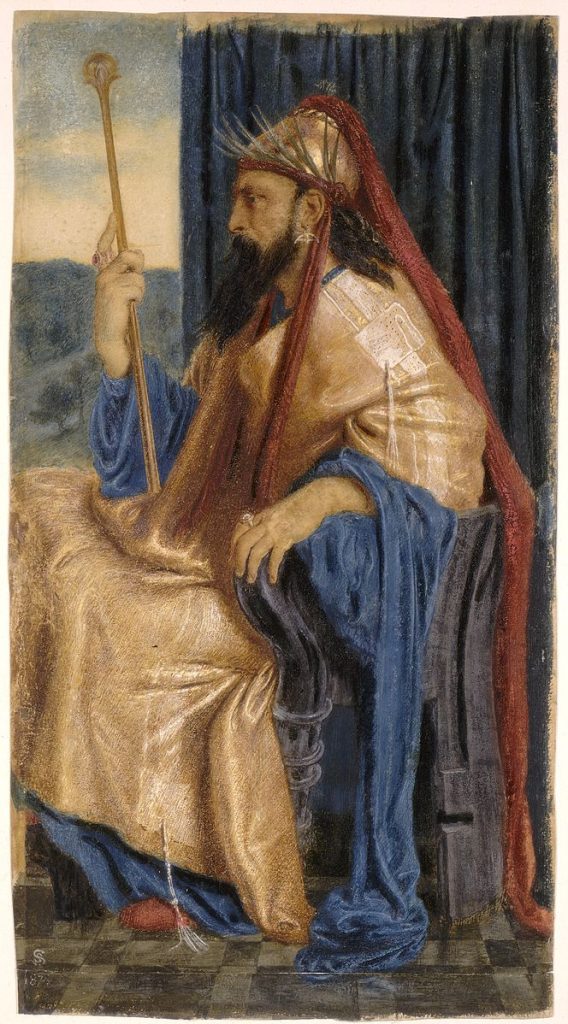
Adonijah was the oldest surviving son and natural heir. When David was close to death, he acquired chariots and a bodyguard; he invited the key men of David’s court, to a feast, those who had been David’s men from the early days in Hebron like Joab the general and Abiathar the priest. He did not invite those who had become powerful while in Jerusalem such as Zadok the priest, Nathan the prophet, Benaiah the captain of the king’s guards.
Nathan then hatched a plot with Bathsheba, Solomon’s mother. She went in to remind David that had promised that Solomon would be king but that Adonijah was acting as if he was king, holding a feast and sacrificing cattle and sheep. Nathan followed and added that the guests at the feast were proclaiming Adonijah as king. (This was not true).
The old king was furious and ordered Solomon to be crowned immediately. He was anointed and proclaimed by Zadok, Nathan and Benaiah. When Adonijah’s guests heard the news the feast broke up and all fled in fear.
Solomon said that he would spare the lives of his step-brother and his supporters, but clearly waited for an excuse to pick them off one by one, so that in a short space of time Adonijah and Joab were killed and Abiathar the priest was exiled. Job done.
In 1 Kings 2 these vindictive murders were ordered by David on his deathbed. Frankly, I don’t believe that. I don’t believe that is how David would reward Joab’s lifelong loyalty. I think it is propaganda.
Clever, but not nice.
4 Solomon the Despot
From community leader to hereditary monarch
The first king of Israel, Saul, was a charismatic war leader who was chosen partly by a prophet anointing him and partly by the people.
David started off as king over the tribe of Judah, anointed by the men of Judah. It was only after a 7-year civil war that ‘all the elders of Israel came to the king at Hebron; and King David made a covenant with them at Hebron before the Lord, and they anointed David king over Israel.’ (2 Samuel 5.3)
Thirty three years later, it was simply a matter of “our lord King David has made Solomon king” (1 Kings 1.43)
Conspicuous Power
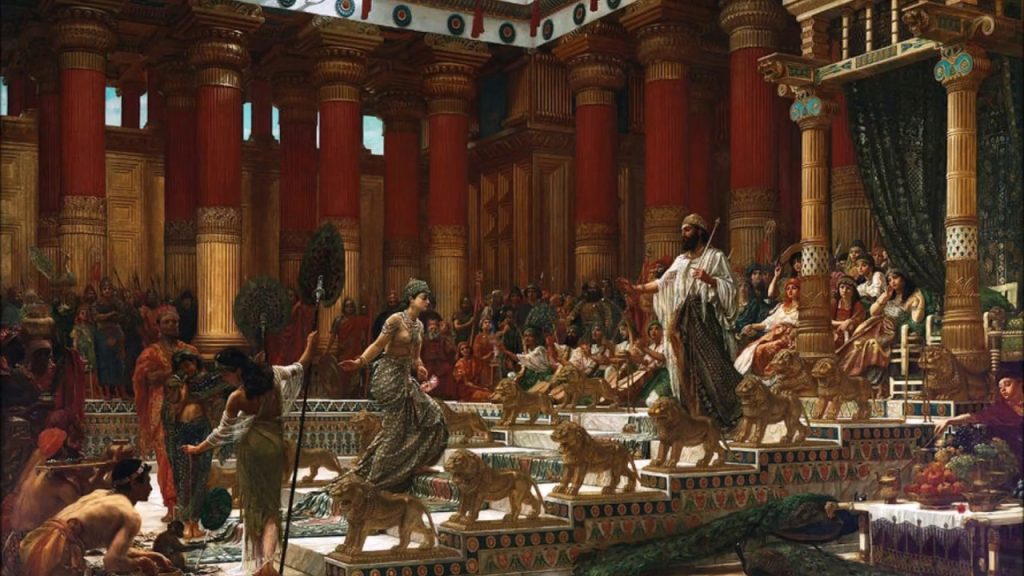
a. Foreign Alliances ‘Solomon made a marriage alliance with Pharaoh king of Egypt; he took Pharaoh’s daughter and brought her into the city of David, until he had finished building his own house and the house of the Lord and the wall around Jerusalem. (1 Kings 3.1)
‘King Solomon loved many foreign women along with the daughter of Pharaoh: Moabite, Ammonite, Edomite, Sidonian, and Hittite women. Solomon clung to these in love. Among his wives were seven hundred princesses and three hundred concubines; and his wives turned away his heart.’ (1 Kings 11.1, 3)
He had a particularly close alliance with Hiram king of Tyre.
Bureaucracy and Forced Labour
Solomon doubled the number of his chief officials from six to eleven and appointed twelve district governors, who were responsible for supplying the palace with large quantities of flour and meal, barley and straw, cattle, sheep and gazelles month by month. The districts were not coterminous with the traditional tribal areas.
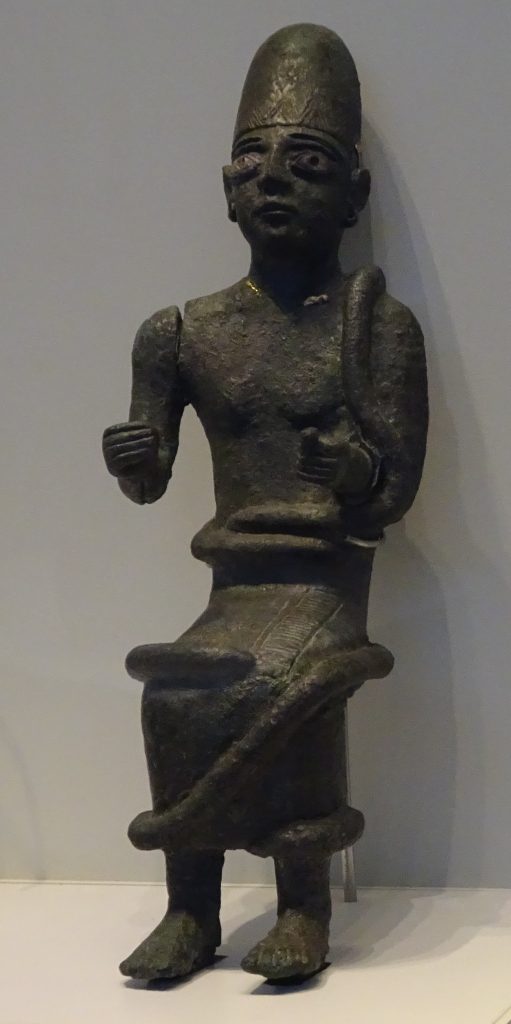
He undertook vast building projects. Quite apart from the temple, which was 1,200 sq cubits, he also built the Palace of the Forest of Lebanon (5,000 sq cubits), a similar palace for himself and one for his Egyptian wife (1 Kings 7). ‘King Solomon conscripted forced labour out of all Israel; the levy numbered 30,000 men. He sent them to the Lebanon, 10,000 a month in shifts; they would be a month in the Lebanon and two months at home; Adoniram was in charge of the forced labour. Solomon also had 70,000 labourers and 80,000 stonecutters in the hill country, besides Solomon’s 3,300 supervisors who were over the work,’ (1 Kings 5.13-16) and had 550 officials overseeing his building projects.
To do all this, he established a professional bureaucracy after the Egyptian pattern. This was probably the instrument for creating the three thousand proverbs and one thousand songs which put in a memorable form the accumulated knowledge and wisdom of the ancient world. See particularly Proverbs 22.23 – 23.end which echoes an Egyptian book of proverbs probably written about 1300 BCE.
Wealth and Weakening
He started his own navy, and with the tolls he extracted for the trade routes he commanded, became incredibly rich.
When the queen of Sheba visited Solomon, she only saw his vast wealth and knowledge. ‘When the queen of Sheba had observed all the wisdom of Solomon, the house that he had built, the food of his table, the seating of his officials, and the attendance of his servants, their clothing, his valets, and his burnt-offerings that he offered at the house of the Lord, there was no more spirit in her.’ (1 Kings 10.4-5)
She did not see the downside, which had been spelt out by the prophet Samuel when the Israelites first asked for a king:
“These will be the ways of the king who will reign over you: he will take your sons and appoint them to his chariots and to be his horsemen, and to run before his chariots; …and some to plough his ground and to reap his harvest, and to make his implements of war and the equipment of his chariots. He will take your daughters to be perfumers and cooks and bakers. … He will take one-tenth of your flocks, and you shall be his slaves. And in that day you will cry out because of your king, whom you have chosen for yourselves; but the Lord will not answer you in that day.” (1 Samuel 8.11-18)
Despite his wealth, Solomon handed on an empire smaller than David’s. He lost control of Edom, Syria, and had enemies within and outside Israel, who all found refuge and support in the Egyptian court.
The Reckoning
Solomon’s kingdom collapsed almost immediately. His son Rehoboam succeeded him in Judah, and went to Shechem to get the consent of the ten northern tribes. They asaid to Rehoboam, “Your father made our yoke heavy. Now therefore lighten the hard service of your father and his heavy yoke that he placed on us, and we will serve you.” Rehoboam ignored the advice of his older counsellors, took the advice of his young companions and said, “My father laid on you a heavy yoke, I will add to your yoke. My father disciplined you with whips, but I will discipline you with scorpions.” ’ The result was rebellion and the lynching of Adoniram, the king’s official in charge of forced labour. Rehoboam fled back to Jerusalem. The kingdom remained split for the next two centuries.
So – how truly wise was Solomon?
5 The Temple

The one thing we can count in Solomon’s favour was that he built the temple, surely?Maybe, maybe not. It all depends if you think it was what God wanted.
In 2 Samuel 7 David had an attack of conscience. ‘See now, I am living in a house of cedar, but the ark of God stays in a tent.’ Nathan says, “Go ahead”, but in the night God intervenes:
“Go and tell my servant David: Thus says the Lord: Are you the one to build me a house to live in? I have not lived in a house since the day I brought up the people of Israel from Egypt to this day, but I have been moving about in a tent … Moreover, the Lord declares to you that the Lord will make you a house. When you lie down with your ancestors, I will raise up your offspring after you, and I will establish his kingdom.”
In other words, “You want to build me a house of stone? I will build you a house of family.” A clear message, whose clarity is muddied by just one verse which looks like it was added later: “He shall build a house for my name, and I will establish the throne of his kingdom for ever.” (2 Samuel 7.13). Was it added by an obedient royal scribe? A way to justify the radical step Solomon took?
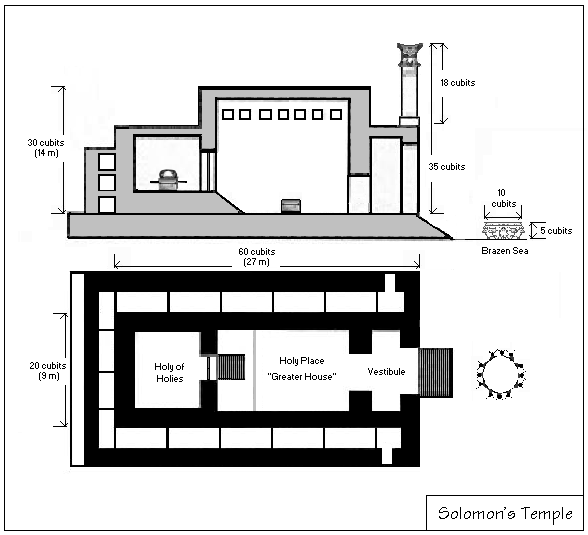
The temple was built after the best pagan models. It was a symbol of royal authority over religion. And much smaller than any of the palaces Solomon built for himself. As the priest at Bethel said a hundred years later about the temple there: “Never again prophesy at Bethel, for it is the king’s sanctuary, and it is a temple of the kingdom.” (Amos 7.13)
The great prayer of blessing at the dedication of the Temple in 1 Kings 8 is impressive. However, the blessing is strictly conditional, with hopefully a way back, and seems to be written after the experience of exile: ‘When your people Israel, having sinned against you, are defeated before an enemy but turn again to you, confess your name, pray, and plead with you in this house, then hear in heaven, forgive the sin of your people Israel, and bring them again to the land that you gave to their ancestors.’ (1 Kings 8.33-34)
Building the temple certainly did not keep Solomon loyal to the Lord. ‘Then Solomon built a high place for Chemosh the abomination of Moab, and for Molech the abomination of the Ammonites, on the mountain east of Jerusalem. He did the same for all his foreign wives, who offered incense and sacrificed to their gods.’ (1 Kings 11.7-8)
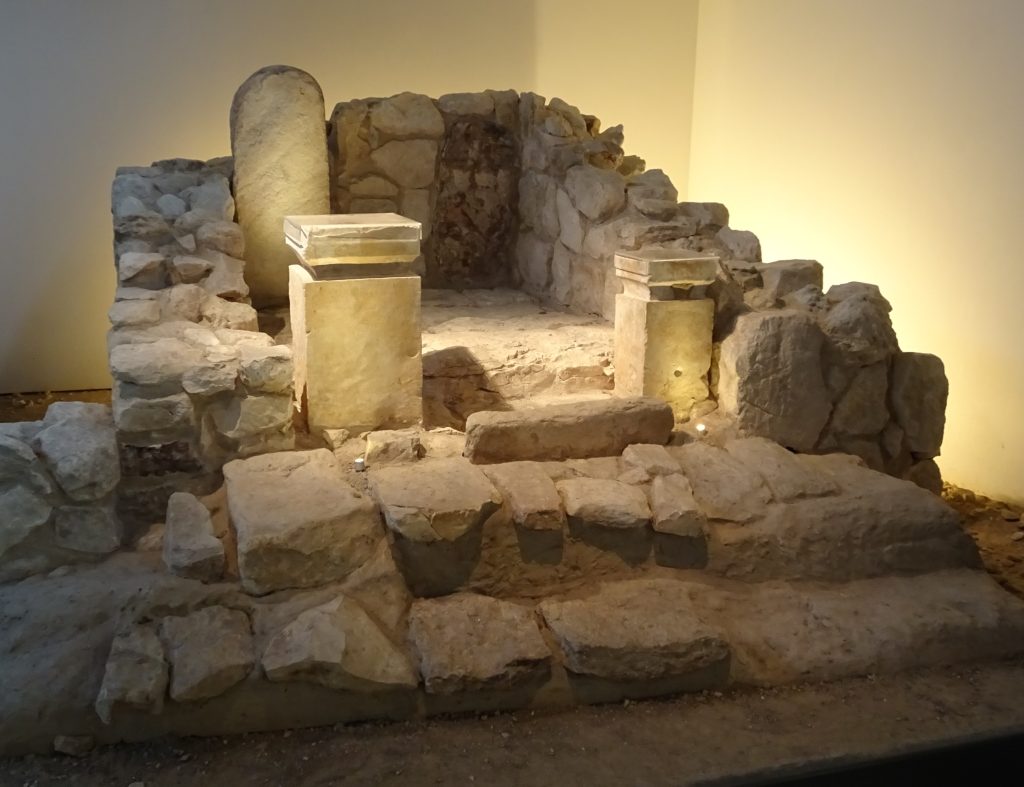
Even without chasing after foreign gods, there was the spiritual danger that the temple could become the people’s security blanket. As Jeremiah said three hundred years later: “Thus says the Lord of hosts, the God of Israel: Amend your ways and your doings, and let me dwell with you in this place. Do not trust in these deceptive words: ‘This is the temple of the Lord, the temple of the Lord, the temple of the Lord.’” (Jeremiah 7.3-4)Visit of teh Queen of Sheba by E J Poynter
Or in the words of the scribe who had a discussion with Jesus: “You are right, Teacher; you have truly said that ‘he is one, and besides him there is no other’; and ‘to love him with all the heart, and with all the understanding, and with all the strength’, and ‘to love one’s neighbour as oneself’,—this is much more important than all whole burnt-offerings and sacrifices.” When Jesus saw that he answered wisely, he said to him, “You are not far from the kingdom of God.” (Mark 12.32-34)
End of Term Report
Solomon’s reign was notable for his autocratic power and the enormous wealth he accumulated in his temple and palaces. It did not last. Within a year the kingdom had split in two, with the wealthier northern part gaining its independence. Within five years the Egyptian Pharaoh had invaded and taken all the temple and palace treasures.
Pride goes before a fall.
